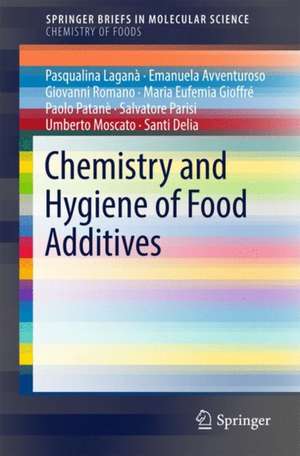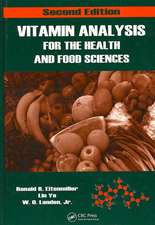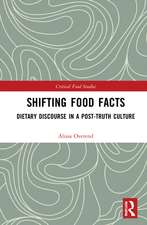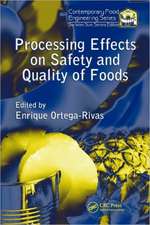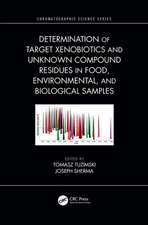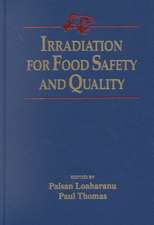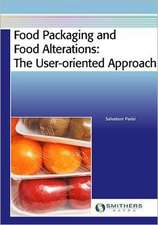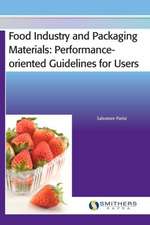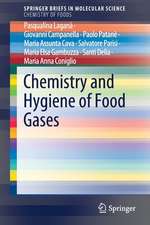Chemistry and Hygiene of Food Additives: SpringerBriefs in Molecular Science
Autor Pasqualina Laganà, Emanuela Avventuroso, Giovanni Romano, Maria Eufemia Gioffré, Paolo Patanè, Salvatore Parisi, Umberto Moscato, Santi Deliaen Limba Engleză Paperback – 10 mai 2017
Din seria SpringerBriefs in Molecular Science
-
 Preț: 411.46 lei
Preț: 411.46 lei -
 Preț: 379.09 lei
Preț: 379.09 lei -
 Preț: 356.49 lei
Preț: 356.49 lei -
 Preț: 441.25 lei
Preț: 441.25 lei -
 Preț: 389.70 lei
Preț: 389.70 lei -
 Preț: 376.22 lei
Preț: 376.22 lei -
 Preț: 348.77 lei
Preț: 348.77 lei -
 Preț: 345.14 lei
Preț: 345.14 lei -
 Preț: 347.68 lei
Preț: 347.68 lei -
 Preț: 346.70 lei
Preț: 346.70 lei -
 Preț: 376.43 lei
Preț: 376.43 lei -
 Preț: 342.14 lei
Preț: 342.14 lei -
 Preț: 375.23 lei
Preț: 375.23 lei -
 Preț: 375.23 lei
Preț: 375.23 lei -
 Preț: 379.09 lei
Preț: 379.09 lei -
 Preț: 376.59 lei
Preț: 376.59 lei - 15%
 Preț: 461.73 lei
Preț: 461.73 lei -
 Preț: 378.12 lei
Preț: 378.12 lei -
 Preț: 376.59 lei
Preț: 376.59 lei -
 Preț: 376.59 lei
Preț: 376.59 lei -
 Preț: 375.23 lei
Preț: 375.23 lei -
 Preț: 351.18 lei
Preț: 351.18 lei -
 Preț: 377.73 lei
Preț: 377.73 lei -
 Preț: 372.73 lei
Preț: 372.73 lei -
 Preț: 378.54 lei
Preț: 378.54 lei -
 Preț: 376.96 lei
Preț: 376.96 lei -
 Preț: 377.35 lei
Preț: 377.35 lei -
 Preț: 378.12 lei
Preț: 378.12 lei -
 Preț: 376.04 lei
Preț: 376.04 lei -
 Preț: 346.59 lei
Preț: 346.59 lei -
 Preț: 375.45 lei
Preț: 375.45 lei -
 Preț: 377.73 lei
Preț: 377.73 lei -
 Preț: 381.00 lei
Preț: 381.00 lei -
 Preț: 377.18 lei
Preț: 377.18 lei -
 Preț: 376.96 lei
Preț: 376.96 lei -
 Preț: 380.07 lei
Preț: 380.07 lei -
 Preț: 376.22 lei
Preț: 376.22 lei -
 Preț: 343.72 lei
Preț: 343.72 lei -
 Preț: 376.22 lei
Preț: 376.22 lei -
 Preț: 377.35 lei
Preț: 377.35 lei -
 Preț: 343.72 lei
Preț: 343.72 lei -
 Preț: 376.22 lei
Preț: 376.22 lei -
 Preț: 375.07 lei
Preț: 375.07 lei -
 Preț: 374.85 lei
Preț: 374.85 lei - 15%
 Preț: 464.97 lei
Preț: 464.97 lei -
 Preț: 376.43 lei
Preț: 376.43 lei -
 Preț: 341.75 lei
Preț: 341.75 lei -
 Preț: 374.30 lei
Preț: 374.30 lei -
 Preț: 375.23 lei
Preț: 375.23 lei -
 Preț: 377.57 lei
Preț: 377.57 lei
Preț: 407.67 lei
Nou
Puncte Express: 612
Preț estimativ în valută:
78.01€ • 81.66$ • 64.55£
78.01€ • 81.66$ • 64.55£
Carte tipărită la comandă
Livrare economică 05-19 aprilie
Preluare comenzi: 021 569.72.76
Specificații
ISBN-13: 9783319570419
ISBN-10: 3319570412
Pagini: 46
Ilustrații: IX, 46 p. 1 illus. in color.
Dimensiuni: 155 x 235 x 3 mm
Greutate: 0.1 kg
Ediția:1st ed. 2017
Editura: Springer International Publishing
Colecția Springer
Seriile SpringerBriefs in Molecular Science, Chemistry of Foods
Locul publicării:Cham, Switzerland
ISBN-10: 3319570412
Pagini: 46
Ilustrații: IX, 46 p. 1 illus. in color.
Dimensiuni: 155 x 235 x 3 mm
Greutate: 0.1 kg
Ediția:1st ed. 2017
Editura: Springer International Publishing
Colecția Springer
Seriile SpringerBriefs in Molecular Science, Chemistry of Foods
Locul publicării:Cham, Switzerland
Cuprins
Classification and Technological purposes of Food Additives: the European point of view.- The Codex Alimentarius and the European Legislation on Food Additives.- Food Additives and Effects on the Microbial Ecology in Yoghurts.- Use and Abuse of Food Additives in Edible Products. Health Consequences for Consumers.
Notă biografică
Pasqualina Laganà is a Biologist with a MSc from the University of Messina, Italy, and specialisations in General Pathology (1992) and Chemistry and Food Technologies (2000). Graduated in ‘Risks and disorders in the Work’ (1998) and in ‘Parasitology of Territory’ (2009), she has also obtained in 2013 a Master in ‘Epidemiology and Biostatistics’ (Università Cattolica del Sacro Cuore, Rome, Italy). Since 1996 she has been Adjunct Professor of General and Applied Hygiene, and Researcher at the Faculty of Medicine and Surgery at the University of Messina. Member of the Italian Society of Hygiene, Preventive Medicine and Public Health (S.It.I.), and the Italian Study Group Hospital Hygiene and Italian Foods Group, she is also the Responsible of Analysis within the Regional Reference Laboratory for clinical and environmental Legionella Surveillance (branch of Messina, Sicily) since 2012, and the Head of the Laboratory from October 2016 onwards. She is a member of the Editorial Board of several Journals, including the Journal of Clinical Microbiology and Biochemical Technology (JCMBT), Zeszyty Naukowe (Gdynia Maritime University, Poland), Global Drugs and Therapeutics (GDT) and EC Microbiology (ECMI). She is also a Referee for various international scientific journals and the author of 70 publications indexed in Medline and other databases.
Emanuela Avventuroso is a Medical Surgeon graduated from University of Messina, Italy. Since 2012 she is a Doctor in Specialist Training in Hygiene and Preventive Medicine at the University of Messina. Dr Avventuroso had the opportunity to deepen some of the different areas within Hygiene and Public Health, particularly in the early years of her specialisation in Food and Environmental Hygiene, and then taking care of Vaccinations, Infectious Diseases and Health Management.
Giovanni Romano is a dietician with a MSc cum laude at the University of Messina, Italy, and he holds a ‘sportnutritionist expert’ certification from the SANIS School, Italian National Olympic Committee (CONI), Palermo, Italy. He also holds an international certification for sport nutrition and supplementation. Dr Romano is currently responsible for the ‘Nutrition and Diet Therapy’ in a Private Bio-Medical Office, Lamezia Terme, Italy. He is also member of the 'International Society of Sport Nutrition’ (USA) and the nutrition expert of provincial AVIS, Catanzaro, Italy. In addition, Dr Romano has lectured sport nutrition for the Italian pilot project ‘Muoviamoci Insieme’ in cooperation with CONI Calabria, Italy.
Maria Eufemia Gioffrè graduated in Biology Science at the University of Messina, Italy, in 2008. She has been qualified at the same University as Biologist. She obtained the PhD in ‘Applied Hygiene’ in April 2012 at the same University, and nowadays, she works as a Quality Control Manager for a food company, with other professional consultancies in the food sector. Dr. Gioffrè has given important scientific contributions in the fields of Food Hygiene and Food Microbiology.
Paolo Patanè is graduated in law, top marks, at the University of Messina, Italy, and he has obtained a MSc in Innovation and Development of Intellectual Property in Rome. After the successful Italian state examination to become a lawyer, Dr Patanè has worked as consultant for legal and administrative aspects of the Sicilian Regional Authority, being in charge of Management EU funds in the Operating Regional Programme ‘POR Sicilia 2000-2006’. He was also General Secretary of the Faculty of Medicine and Surgery at the University of Messina (2007-2013). After a short period at the Department of Clinical and Experimental Medicine (2013-2015), he is now the Head of the Office of the University of Messina, and responsible for protecting the Intellectual Property Rights of the inventions from the university staff. He has also been a University contract professor (2013/2014 and 2014/2015) at the Messina University, and a lecturer in 2015 and 2016 at seven workshops about Intellectual Property Rights. Dr Patanè has also published several issues about law (“Authority”, “Ombudsman”, “Spoils System”, “Prisoners population in Italy”).
Salvatore Parisi is a chemist and food scientist, working as a consultant for the food industry and as a lecturer in the academia. He obtained his MSc from the University of Palermo, and PhD from the University of Messina, Italy. Dr. Parisi is also a Preventive Controls Qualified Individual (PCQI) after the successful completion of the FSPCA Preventive Controls for Human Food course in 2016 (according to new U.S. regulations). He serves as series editor for the SpringerBriefs in Molecular Science: Chemistry of Foods and he is a member of the Editorial Board of different scientific journals. Dr. Parisi is an associate of the Sicilian Order of Research Chemists, Italy, and many other international Associations, including the EFSA’s Expert Database, Parma, Italy, and the FAO Food Safety Expert Roster, FAO, Rome, Italy. In addition, Dr. Parisi is a member of the AOAC Official Methods of Analysis SM (OMA) Expert Review Panel (ERP) for Fertilizers. He has an important scientific contribution (with more than 120 articles, books and software) in the fields of Packaging Technology, Polymer Chemistry, Shelf Life Prediction and Food Microbiology (Italian Oxoid Award, 2001).
Prof. Umberto Moscato is a Medical Doctor, specialist in Hygiene, and an Associate Professor of General and Applied Hygiene at Università Cattolica del Sacro Cuore, Rome. He currently holds several positions as a professional consultant for public and private healthcare facilities for welfare services. He is a member of several scientific societies and, in particular, a member (and now President) of the Scientific Board of the Italian Society of Hygiene, Preventive Medicine and Public Health (S.It.I.). He is a Referee and Member of various national and international organizations and scientific journals, including the Italian Ministry of Health, the World Health Organization, the European Center of Control Disease, Annals of Hygiene, Prevention Today, and BioMed Central Journals. Since 2003 he is a member of the Editorial and Scientific Board of the Italian Journal of Public Health. At present, Professor Moscato has different assignments by Italian and International Institutions, including the Faculty of Medicine and Surgery ‘A. Gemelli’ and the Polytechnic University of Milan. His research activity covers new analytical methods in biochemistry, physics, and toxicology as is documented in approximately 252 publications indexed in Medline and other databases, as well as congress extended papers, journal articles, congress abstracts, monographs, books and book chapters.
Prof. Santi Antonino Delia is a full professor of Hygieneat University of Messina, Italy. After an initial scholarship in 1974, he was appointed assistant at the same Institute of Hygiene since 1976. From 1989 to 2007 he worked at the Healthcare Management of University Hospital in Messina taking care of the Hygienic issues. During this period he was the Coordinator of the Commission Nosocomial Infections Operative Group and Chairman of the Commission Surveillance for Food Arrangements, and the responsible for two official teachings in the Degree Course of Medicine and Surgery. Also, he lectured different Postgraduate Schools and degree Courses. Professor Delia was the Director of the Master course in ‘Food Hygiene and Food Legislation’ and the Coordinator of three cycles of PhD School in ‘Applied Hygiene’. He was also the Director of the Department of Hygiene, Preventive Medicine and Public Health ‘R. De Blasi’ (University of Messina), the Director of the Food Laboratory and of Regional Reference Laboratory for Environmental and Clinical Surveillance of Legionellosis until September 2016. Professor Delia has taken part in numerous conventions, conferences, roundtables, advanced training courses, as a speaker and/or moderator. His scientific activity is documented with more than 150 scientific articles, books and book chapters.
Textul de pe ultima copertă
This brief addresses important aspects of food additives. Through four chapters, the authors describe the chemistry of food additives, the regulatory classification of additives on a large-scale, the risks involved in using chemicals for food preparation – including implications this has on food hygiene, and case-study examples taken from the dairy industry. More specifically, chapter one provides a list of the technological purposes of food additives defined for European use; chapter two explains the 'General Standards for Food Additives' (Codex Alimentarius Commission) which is a harmonised, workable and indisputable international standard; chapter three describes the use of selected food additives in the dairy sector, particularly with relation to the production of yoghurt products; and chapter four addresses the impact of additives on human health. This brief is of interest to researchers working in the area of food production and international regulation, both in academia and industry.
Caracteristici
Provides an overview of relevant guidelines for the use of food additives in Europe Gives case studies of how food additives are used in the dairy industry Explains the fundamentals of the risks associated with food additives Includes supplementary material: sn.pub/extras Includes supplementary material: sn.pub/extras
